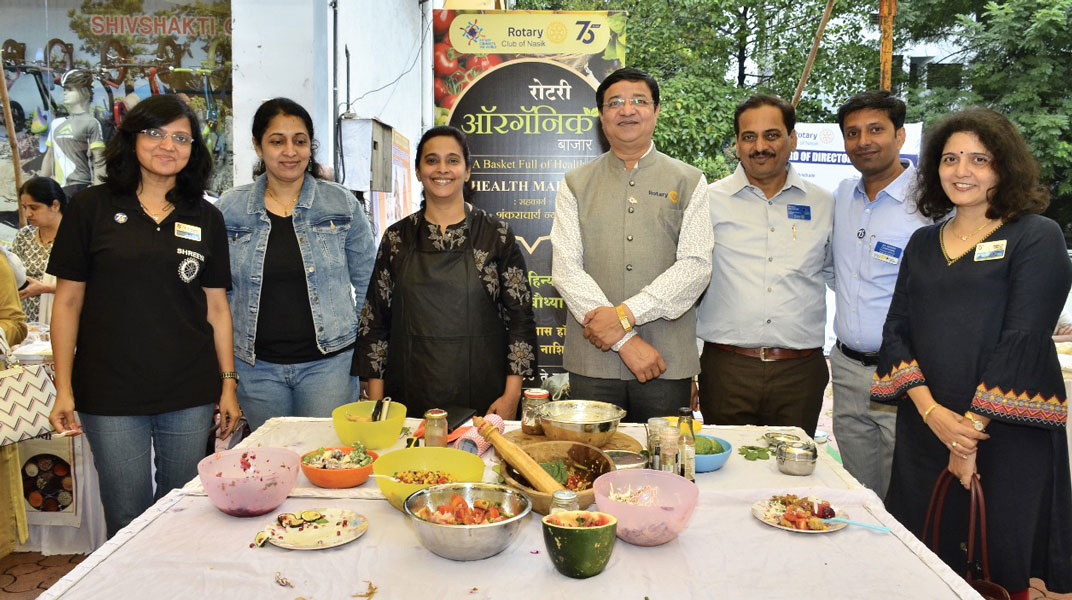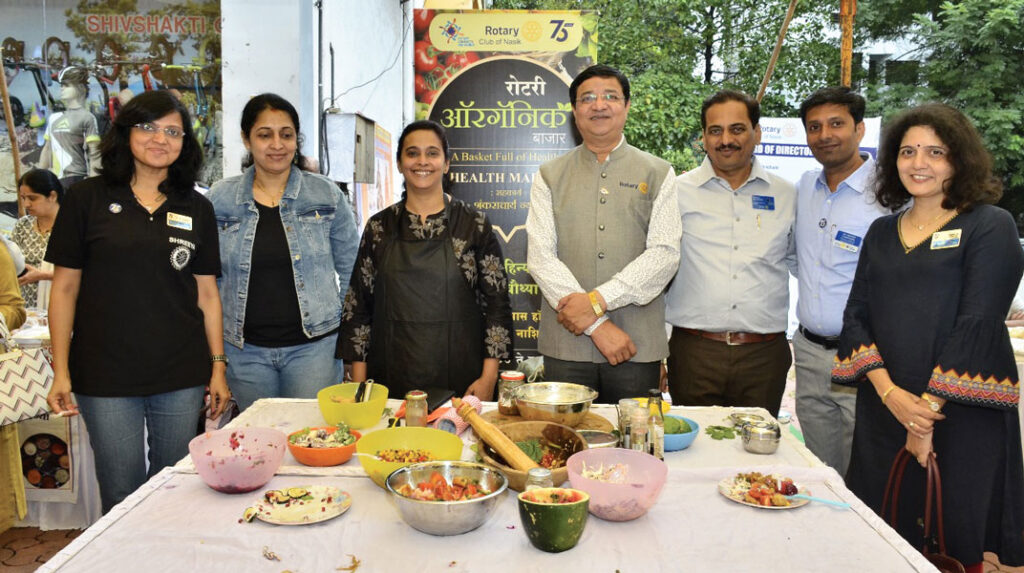Combining two of Rotary’s core areas — enhancing livelihood and protecting the environment — into a single project, and adding a third dimension critical to the distressed Indian farmer, Rotary Club of Nasik, RI District 3030, has successfully launched a project making organic farming profitable and sustainable for farmers of the region.

The club is celebrating its 75th year. Last year, under the leadership of agricultural expert Hemraj Rajput, a member of the club, who is also a professor at the local agriculture university, the club introduced a Rotary Organic Bazaar at its own Rotary Hall in the city.
Says Club Secretary and President-nominee Shreeya Kulkarni, the idea was to do a service project that would benefit “our farmers as farming is the backbone of Indian economy. We all know that the middlemen take away most of the profits for the crops that farmers grow. Also, as in India farming is mostly dependent on seasonal rainfall, income from it is both uncertain and unpredictable.”
Rajput, the expert, suggested that farmers should be dissuaded from using chemicals and pesticides for cash crops such as vegetables and fruits and hence it was decided to choose organic farmers and give them a marketing mechanism to sell their produce without middlemen cutting into their income.
The Rotary Organic Bazaar was advertised through social media, fliers and pamphlets and initially the bazaar was held on alternate Tuesdays. To make it more vibrant and involve and benefit more farmers and make the initiative sustainable, “a committee was formed for this project under the chairmanship of Tushar Ugale.”
The committee decided that to make this initiative even more successful it should be moved to a more customer-friendly and prime location in the city and organised on the second and fourth Sunday of every month. The Rotarians zeroed in on a popular hall centrally located in the city and “we rented the car park for ₹5,000 and turned it into a place for the farmers to display their produce.” An interesting tidbit she shares is that as the prices of onions have soared in Maharashtra as well as the rest of India, “last week the farmers brought organic onions which they priced at ₹30 a kg. They were of very good quality and the entire lot was sold out in 30 minutes!”
To make the project sustainable, the committee has worked on the economics of the bazaar, framed detailed rules and guidelines and almost 80 per cent of the space is pre-booked on a yearly membership basis. Now the bazaar is on an auto mode, says Community Service Director Omprakash Rawat.
The farmers bring in all kinds of vegetables and fruits. The club tries to encourage even marginal and tribal farmers to participate. Shreeya shares an interesting nugget: During September-October, tribal farmers grow a vegetable called ran bhajya (jungle vegetables, in Marathi). “This is very nutritious and rich in iron and calcium but is not easily available and many people don’t know how to prepare it.”
So during market days, the tribal farmers who grow and consume this vegetable demonstrated how to prepare it. This way, value addition is done; self-help groups of women, engaged in farming, are encouraged to bring in their organic produce, as well as dry items like papad, pickles, etc. “And during the Diwali season, we asked them to display homemade traditional sweets, and they also held a demo of how to make different types of salad,” says Shreeya.
Club President Manish Chindhade adds that seeing the success of the organic bazaar the club members are planning to make it a weekly event and also organise a workshop for farmers where they will be trained on better marketing techniques and other features associated with getting more profit from farming.
Bicycles for girl students
In another service project undertaken at the village Darewadi, situated in a remote area of the Igatpuri region, where villagers were displaced for the building of a dam, the club is giving bicycles to girl students to reach school. Says Chindhade, “Half of this village is on the top of a hill and half the villagers are still living in temporary tin sheds at the base. Thus many primary school students have to travel miles to reach their school, and several girls dropped out due to lack of transportation.”

And frequent landslides due to heavy rains added to the students’ difficulty. As the village is located in a scenic area, during a Sunday morning trek, the Rotarians chanced upon the difficulties faced by the villagers, particularly the students. The club members identified their requirements such as raincoats, shoes, computers, cycles for girls. It was decided to distribute 75 cycles and 75 computer systems, and 25 old bicycles, repaired and refurbished, have been handed over to the girls. Two computers systems and footwear, raincoats, blankets for elderly citizens and sweets during Diwali were also given.








